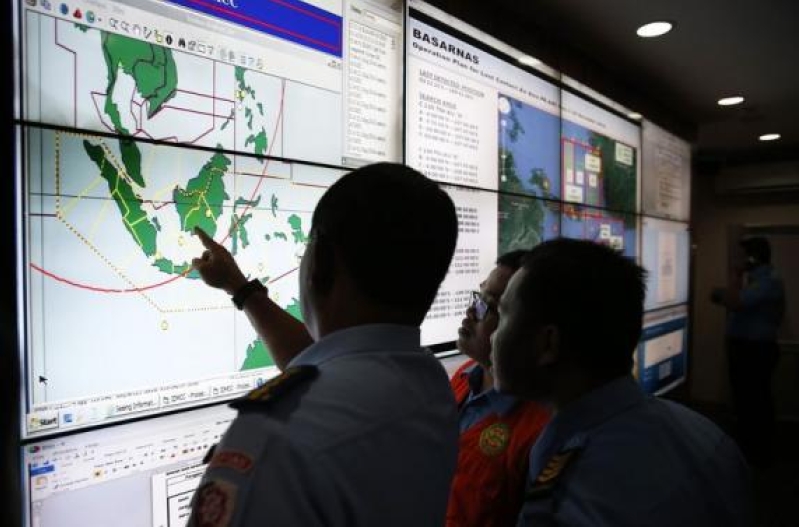
Planes and ships searched Indonesian waters for two days in hopes of finding the AirAsia jet that went missing in the midst of a storm. However, nothing significant has been found so far.
According to Ben Otto, I Made Sentana and Gaurav Raghuvanshi of the Wall Street Journal, search-and-rescue authorities widened their search area Monday morning to look for the missing jet, which lost contact with air traffic controllers on its flight from the Indonesian city of Surabaya to Singapore. The head of the search-and-rescue agency, Bambang Sulistyo, determined its possible location based on the plane's flight track and last known coordinates.
"Our early conjecture is that the plane is in the bottom of the sea," Sulistyo said.
Jethro Mullen, Catherine E. Shoichet and Josh Levs of CNN have reported that according to a senior U.S. official, Indonesia has formally asked the United States for help in the search. The U.S. Navy's 7th Fleet is in the area ready to contribute to search efforts.
Sulistyo said that Indonesia has asked the United States, along with the United Kingdom and France, for help with sonar devices that may be needed for an underwater search. According to CNN, the missing jet was built by Airbus, a French company.
France's Foreign Ministry told CNN that the country has sent two investigators to Indonesia and will arrive in Jakarta on Monday.
The Wall Street Journal reported that Indonesia, Singapore, Malaysia and Australia have deployed a total of 30 vessels and 15 planes to search waters in the Karimata Strait, located midway between Indonesia's main island of Java and Singapore. The Civil Aviation Authority of Singapore, or CAAS, released a statement on what the city-state has contributed to the search.
"Indonesia accepted Singapore's offer of two teams of specialists and two sets of underwater locator beacon detectors from the Singapore Ministry of Transport's Air Accident Investigation Bureau (AAIB), to assist in locating the flight data recorders of the missing Indonesia AirAsia aircraft, QZ8501," the statement said.
CAAS also stated that it has deployed two C-130 aircraft to continue the search. The Singaporean government sent a "side-scan sonar system and a robotic remotely-operated vehicle" to assist in search efforts.
Aviation experts, searchers and investigators alike have wondered why signals had not been detected from the Airbus A320, which had multiple emergency beacons. According to CNN, the beacons, officially known as emergency locator transmitters or ELTs, were supposed to emit signals to satellites upon crashing and last about 30 days.
"If nothing is found in the next 72 hours, the likelihood of finding something decreases substantially," Jonathan Galaviz, partner at Global Market Advisors and an aviation safety expert, said.
Experts told CNN that the emergency signals should be strong, given that the missing plane was in a region that has some of the world's largest islands and where water depths were relatively shallow and mostly less than 50 meters.
"It's very unlikely [for satellites, search aircraft and ships] to miss ELT signals, especially if the aircraft ended in relatively shallow waters," Mark Martin, chief executive at Martin Consulting, an aviation consultancy, said.
In addition, flight-tracking service FlightRadar24 told the Wall Street Journal that the AirAsia jet was the lowest-flying plane in the region when it disappeared.
According to the Wall Street Journal, the pilots of flight QZ8501 wanted permission from Indonesia's Air Traffic Control to climb from 32,000 to 38,000 feet and alter their course by seven miles to avoid inclement weather. However, because air skies were crowded at the time of its disappearance, ATC only allowed them to alter course and go up to 34,000 feet.
"It seems the pilots did ask for a deviation," Galaviz said. "Obviously, there was something there. The fact that they asked for a deviation indicates that they did what they should have. The pilots were acting in a responsible manner."
Galaviz added that "the pilots were proactively seeking a safer route," given that there was both a loss of communication and bad weather.
The AirAsia jet vanished with 162 passengers and crew on board, and all are feared dead, which would make it one of Indonesia's deadliest air accidents according to the Wall Street Journal.







